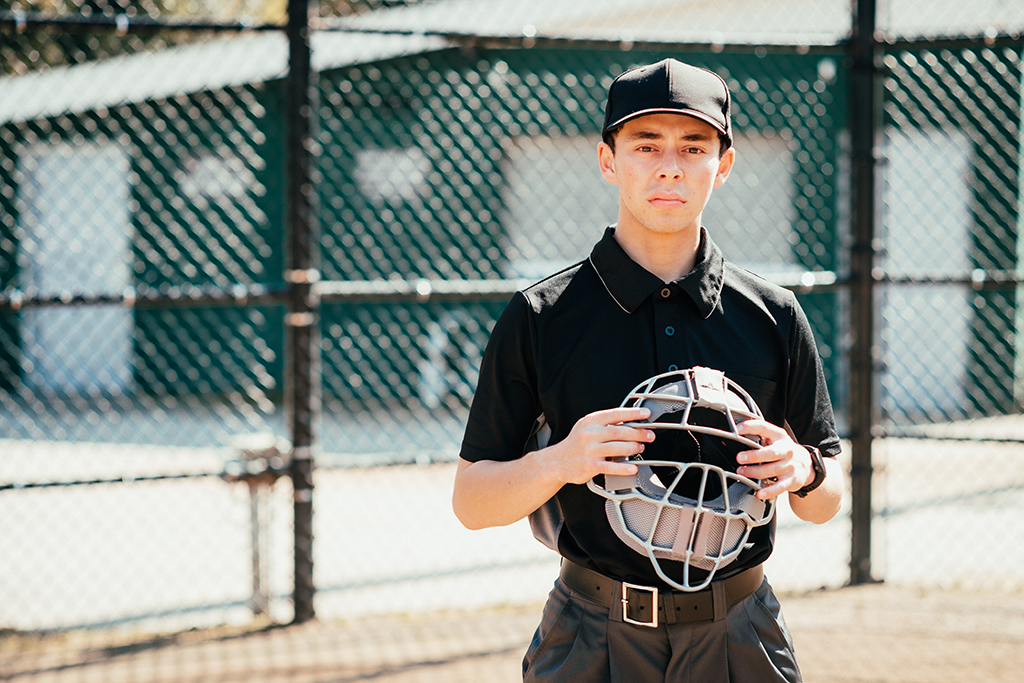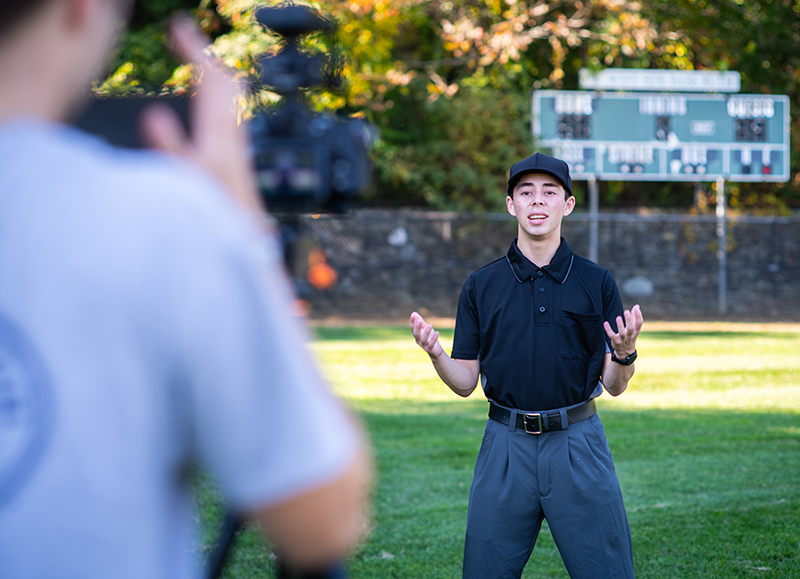With The Umpire Channel, Noah Katz ’26 has made the right call

Noah Katz ’26 was 16 years old and wanted to earn money.
His employment prospects didn’t thrill him.
Yes, he could have continued working in food service, and there certainly was an endless supply of available fast-food jobs around his hometown of Williamsburg, Virginia. But the arrival of COVID shut down dining rooms everywhere, and besides, he was hungry for a new opportunity.
One day, Katz, the third baseman on his high school varsity baseball team, found himself chatting with an umpire in the local youth baseball league where he’d played as a boy. The man convinced him to give umpiring a try — the money was good, he said, and the job would provide Katz an opportunity to indulge his love for the game once his playing days were done.
After some training, Katz found himself behind the plate, calling balls and strikes, signaling “safe” or “out.” He loved it. Not only had he been introduced to the part-time job of his dreams, he felt like he’d been granted access to a secret society that he wasn’t even aware existed, one with its own rhythms, culture, and community. Why didn’t more people know about this?
Because Noah Katz hadn’t yet told them yet.
The secret is out. Katz is the creator and promoter of The Umpire Channel on YouTube, which he describes as “the leading source of umpiring-related content in the world.” In about a year and a half, his channel has attracted an astounding 130,000 followers and 60 million views of his content that celebrates all things umpiring. He’s taken his video camera into ballparks throughout the country to interview umpires and players at just about every level of the sport — from youth leagues to Major League Baseball — becoming an increasingly recognizable presence on the field.

The Umpire Channel is a cross-pollination of several things: Katz’s deep admiration for the umpiring profession, his undeniable entrepreneurial gene, and his skill with social media, where he seems to have mastered the art of generating buzz and building community. A nationally ranked Spikeball player, he hosted a series of successful tournaments in Williamsburg while still in high school, attracting teams from across the country by creating a community of Spikeball enthusiasts on Instagram.
Katz’s journey, above all, is grounded in his passion for baseball, and his desire to always respect and preserve the integrity of the game — no more so than when he was both playing and umpiring high school baseball games.
“On Sunday, I’d be umpiring a travel league game where some of my high school teammates were playing, and on Monday I’d be playing beside them on the field,” he recalls. Katz says he remained rigorously nonpartisan when behind the plate, and had no problem calling teammates out on strikes. They didn’t give him a hard time, he insists. “At most, they might say, ‘You know, that wasn’t a strike.’” He smiles. “But it was.”
The day after he finished high school, Katz made a special trip to the Little League field where he’d played and umpired most of his life. He had his 13-year-old brother film him talking about the challenges and joys of umpiring. “We filmed two videos, and each one of them got 300,000 views in a day, primarily on TikTok. We reached 10,000 followers on TikTok within the first two weeks.”
Katz’s evangelical zeal for this narrowest of niches was evident — and The Umpire Channel was born. People soon responded with a surprising hunger to learn about the umpiring world.
“Essentially every video I make is a video that’s never been made before,” Katz says. “No one was recording umpires walking out to the plate for their pre-game meeting, or talking to Major League umpires about their experiences, or taking you behind the scenes of umpire school. We put it all together on the channel.”
He’s conducted interviews at a number of area ballparks, including Polar Park, home of the Worcester Red Sox, and has done a good deal of work with the Savannah Bananas, a barnstorming team that turns the traditional game into a party. (Below is a video Katz filmed with the Bananas, produced by Katz and Moses Millman ’24.)
Story continues after video
Umpiring is not without its challenges, and those challenges historically have taken center stage in the digital sphere. Countless videos capture umpires being harassed by impossible-to-please parents at youth and high school games. At the Major League level, every missed call has the chance of being immortalized online. If your team loses, chances are you’ll lay some of the blame on the the person who called strike three on your favorite player.
Katz approaches umpiring differently, intentionally emphasizing the positive aspects through his conversations with umpires and players (and yes, the players acknowledge that the task of arbitrating a game can be thankless, but, grudgingly, appreciated). There is currently an umpire shortage across the country, Katz notes, and his mission is to repopulate the ranks.
“I get it, officiating is a tough job. Parents can be bad, coaches can be bad. I’m most interested in showing the human side of umpires; let everyone see the person behind the blue uniform,” he says. “And I’m here to say that it’s an amazing job.
“Some people have told me I should post controversial content,” Katz continues. “But then what am I building? Posting an umpire’s missed calls is a short-term move for views and clicks, but I’m building something for the long term that I hope will be a significant factor in helping solve the umpire shortage. I’ve already received hundreds of messages from people who have told me that through my content, they’ve been inspired to become umpires.”
Katz, a marketing major, is preparing to launch The Umpire Channel’s Guide to the World of Umpiring, which will provide a listing of resources such as umpiring camps and clinics, instructional videos, recommendations for umpiring gear, and a journey map detailing the steps needed to progress through the profession, all the way up to the Major Leagues. He’s also planning to produce long-form documentaries and is considering creating new channels that focus on officiating opportunities in other sports.
Katz isn’t playing much baseball these days. He’s busy with his academics, running track and cross country for Clark, and, of course, growing The Umpire Channel.
His next goal? “I want to get the number of followers into the millions.”


